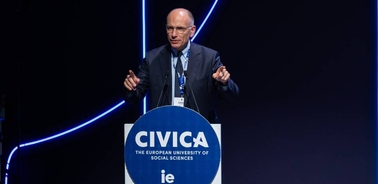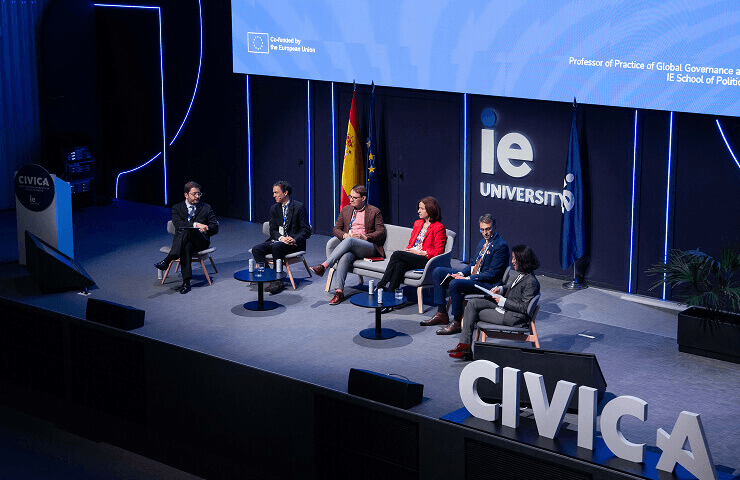- Home
- Civica
- Civica News
- Dean Enrico Letta Opens The Civica Global Forum At Ie University: "we Are Here To Lead The Future Of European Integration"
Dean Enrico Letta opens the CIVICA Global Forum at IE University: "We are here to lead the future of European integration"

IE School of Politics, Economics and Global Affairs led key discussions at the CIVICA Global Forum, the flagship event of the CIVICA alliance, taking place at the IE Tower on May 6-7, 2025.
Enrico Letta, Dean of IE School of Politics, Economics and Global Affairs and former Prime Minister of Italy; Manuel Muñiz, Provost of IE University and Chair for the IE New York College; Borja Santos, Vice Dean; Ilke Toygur, director of the Global Policy Center and Professor Waya Quiviger represented the School as key speakers at the CIVICA Global Forum, held on May 6th and 7th at IE Tower, the vertical campus of IE University in Madrid. Representatives from all ten member universities of CIVICA – The European University of Social Sciences – took part in the event, which brought together academics, students, and policymakers to address the future of the European Higher Education in light of today’s geopolitical and societal challenges, including the impact of nationalist movements on the world of academia, and the increasing importance of Social Sciences in a world of rapid technological advancements.
By hosting the CIVICA Global Forum, IE University —together with the other nine European universities in the CIVICA alliance— reaffirmed its role as a key player in shaping the future of European Higher Education, consolidating its commitment to international collaboration, critical thinking, and the vital role of the social sciences in building Europe’s future.
With over 400 attendees, the CIVICA Global Forum was opened by Dean Enrico Letta, also President of the Jacques Delors Institute, who delivered a keynote titled "Shaping the Future of European Higher Education: The Central Role of the European University Alliances Initiative". "We are here to make a revolution, the revolution of considering that our universities want to lead the future of European integration," he said. "Raising the flag of the Fifth Freedom -knowledge, skills, research and innovation- will be the key to the future of Europe," he added, advocating for a deeper exchange of ideas and collaboration among Higher Education institutions to drive European integration.
IE University Provost Manuel Muñiz also underscored the central role of education in building an intellectually sovereign Europe amid today’s geopolitical challenges during the panel "Higher Education Leadership in Uncertain Times: Geopolitics, Climate Change, and the Growing Impact of New Technologies", with Cornelia Woll, President of Hertie School in Berlin; Carsten Q. Schneider, Interim President and Rector of the Central European University in Vienna; Tymofii Brik, Rector of the Kyiv School of Economic; and Jeremy Perelman, Vice President for International Affairs at Sciences Po Paris, moderated by Professor Waya Quiviger from IE University. In Muñiz’s words, the CIVICA Global Forum represents "a shared commitment to academic excellence, to democratic values and global cooperation."
Finally, Borja Santos, Vice Dean of IE School of IE School of Politics, Economics and Global affairs contributed decisively to the session "Deep Knowledge and Breadth of Vision: What Social Sciences Graduates Bring to the Table" alongside with Thurid Hustedt, Dean of Graduate Programs at Hertie School, Malgorzata Moleda-Zdiech, Rector’s Representative for Cooperation with the EU from the Warsaw School of Economics, and Alexandros Kentikelenis, professor at Bocconi University. Borja Santos pointed out that "A social science graduate offers what algorithms can’t: the ability to work across borders, languages, and cultures. They understand why people think, vote, protest, and cooperate. They grasp what drives human behavior—and that insight allows them to design better policies, services, and institutions."
